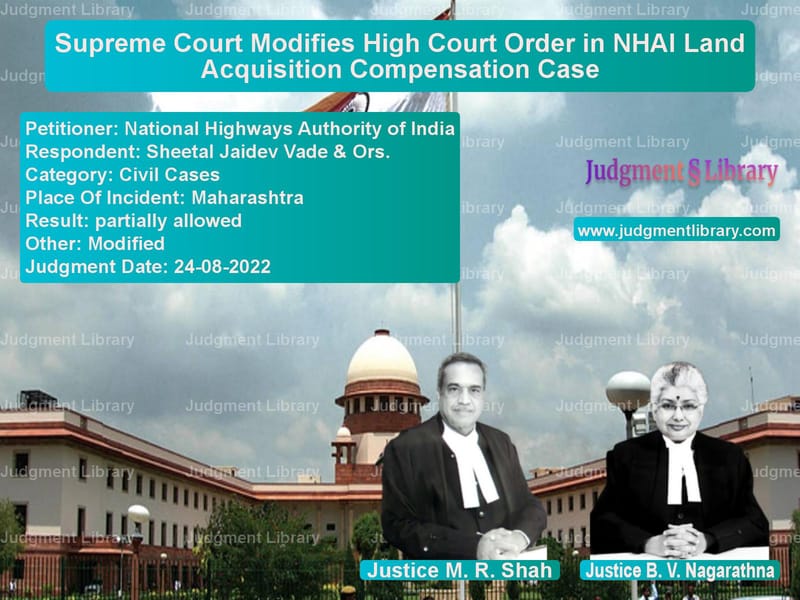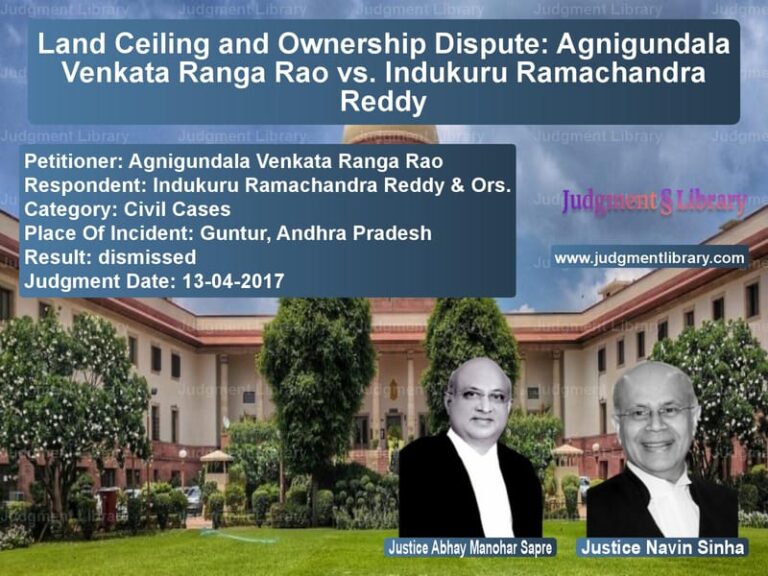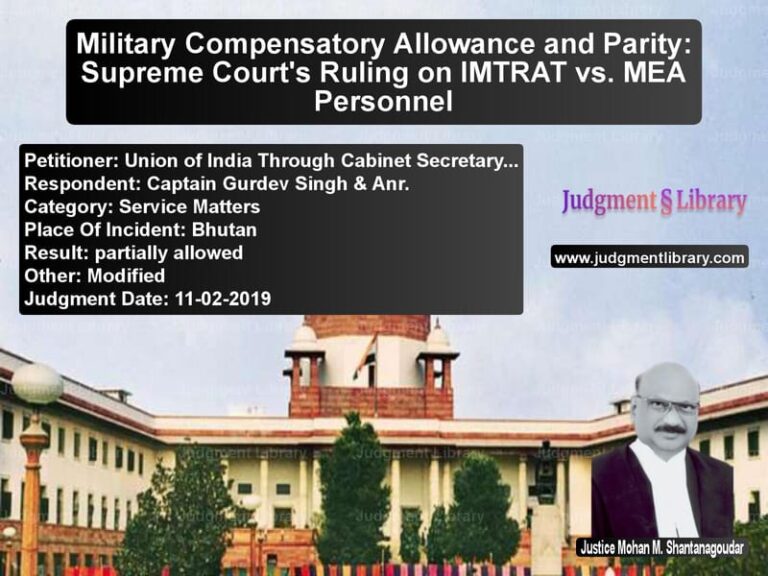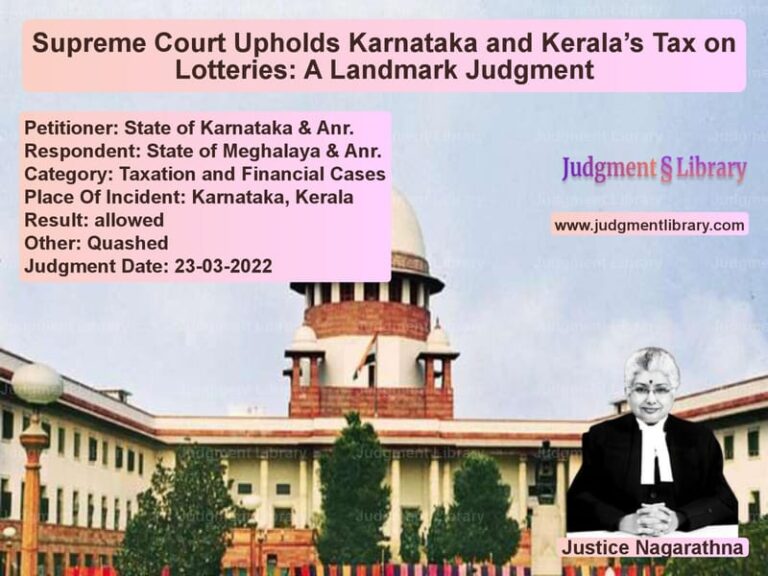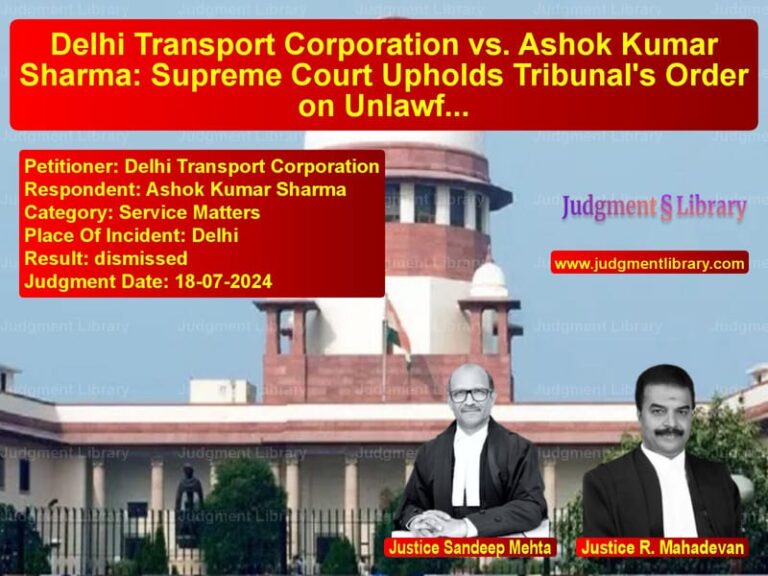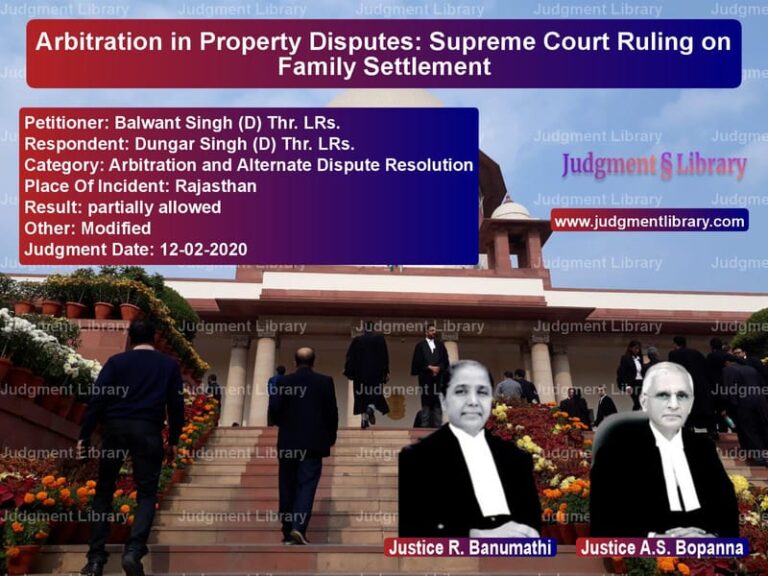Supreme Court Modifies High Court Order in NHAI Land Acquisition Compensation Case
The Supreme Court of India, in National Highways Authority of India v. Sheetal Jaidev Vade & Ors., delivered a significant judgment regarding compensation for landowners whose properties were acquired for highway expansion. The case centered on whether the High Court had the jurisdiction to direct the National Highways Authority of India (NHAI) to deposit compensation as per an arbitral award while the award was under challenge.
Background of the Case
The dispute arose when the NHAI acquired land from the respondents (original landowners) under the provisions of the National Highways Act. The compensation awarded by the Competent Authority for Land Acquisition (CALA) was enhanced by an Arbitrator. However, NHAI challenged this enhanced compensation under Section 34 of the Arbitration and Conciliation Act, 1996. The High Court of Bombay, in its judgment dated April 1, 2022, directed NHAI to deposit the entire amount awarded by the Arbitrator and allowed the landowners to withdraw a significant portion of the compensation.
Key developments in the case:
- The respondents (landowners) filed a writ petition before the Bombay High Court seeking the release of the arbitral award amount.
- The High Court directed NHAI to deposit the entire compensation amount with the Land Acquisition Authority.
- The landowners were allowed to withdraw 50% of the amount unconditionally and 25% upon providing a solvent surety.
- NHAI challenged the High Court’s decision before the Supreme Court, arguing that the award was still under judicial scrutiny.
Petitioner’s (NHAI) Arguments
NHAI, represented by Additional Solicitor General Aishwarya Bhati, contended:
- The High Court erred in exercising its powers under Article 226 of the Constitution to direct execution of an arbitral award while proceedings under Section 34 of the Arbitration Act were pending.
- The landowners had an alternate statutory remedy of execution proceedings before the District Court.
- Releasing 75% of the compensation while the appeal was pending could lead to financial losses if the award was later modified or set aside.
- The Supreme Court, in similar cases, had previously ordered only partial deposits to protect both parties’ interests.
Respondents’ (Landowners’) Arguments
The landowners defended the High Court’s decision, arguing:
- There was no stay on the arbitral award under Section 34 of the Arbitration Act.
- NHAI had taken possession of the land without paying the enhanced compensation, violating the landowners’ rights.
- The High Court acted within its jurisdiction to ensure just and fair compensation for the landowners.
Supreme Court’s Key Observations
The Supreme Court made the following key observations:
- Jurisdiction of the High Court: While the High Court had the power under Article 226, it should have directed the landowners to pursue execution proceedings instead.
- Execution of Arbitral Awards: Awards should be enforced through the statutory mechanism provided in the Arbitration Act.
- Balance of Interests: The Court noted that a balance must be maintained between ensuring compensation for landowners and protecting public funds.
- Precedents on Compensation Deposits: The Supreme Court referred to similar cases where only a portion of the compensation was ordered to be deposited pending final resolution.
Supreme Court’s Judgment
The Supreme Court modified the Bombay High Court’s order and issued the following directives:
- NHAI must deposit 50% of the compensation awarded by the Arbitrator with the Executing Court within four weeks.
- The landowners can withdraw this amount unconditionally.
- The remaining 50% will be deposited after the Section 34 proceedings are concluded.
- The District Court handling the Section 34 proceedings must decide the case within six months.
Impact of the Judgment
This ruling has significant implications for land acquisition cases:
- Clarification on Arbitral Award Execution: The judgment emphasizes that awards should be executed through proper legal channels.
- Fair Treatment for Both Parties: By allowing partial withdrawal, the Court ensures financial relief for landowners while protecting public funds.
- Guidance for Future Cases: The decision sets a precedent for similar disputes where compensation amounts are challenged.
Conclusion
The Supreme Court’s judgment in National Highways Authority of India v. Sheetal Jaidev Vade & Ors. strikes a balance between ensuring just compensation for landowners and maintaining the integrity of arbitral review mechanisms. The decision reinforces the importance of following statutory remedies for executing arbitral awards while allowing partial relief to affected landowners. This ruling will serve as a guiding principle for future land acquisition disputes involving compensation challenges.
Petitioner Name: National Highways Authority of India.Respondent Name: Sheetal Jaidev Vade & Ors..Judgment By: Justice M. R. Shah, Justice B. V. Nagarathna.Place Of Incident: Maharashtra.Judgment Date: 24-08-2022.
Don’t miss out on the full details! Download the complete judgment in PDF format below and gain valuable insights instantly!
Download Judgment: national-highways-au-vs-sheetal-jaidev-vade-supreme-court-of-india-judgment-dated-24-08-2022.pdf
Directly Download Judgment: Directly download this Judgment
See all petitions in Damages and Compensation
See all petitions in Contract Disputes
See all petitions in Public Interest Litigation
See all petitions in Judgment by Mukeshkumar Rasikbhai Shah
See all petitions in Judgment by B.V. Nagarathna
See all petitions in partially allowed
See all petitions in Modified
See all petitions in supreme court of India judgments August 2022
See all petitions in 2022 judgments
See all posts in Civil Cases Category
See all allowed petitions in Civil Cases Category
See all Dismissed petitions in Civil Cases Category
See all partially allowed petitions in Civil Cases Category

